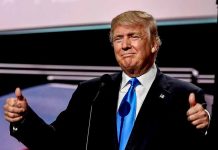
Iran’s latest assassination threats against Donald Trump spark concerns of potential acts of political violence as the 2024 election approaches.
At a Glance
- U.S. intelligence warns of “real and specific” Iranian threats to assassinate Trump
- Threats are believed to be retaliation for the 2020 killing of General Qasem Soleimani
- Trump’s campaign confirms intelligence briefing and increased security measures
- Concerns rise over foreign interference in the upcoming presidential election
- Law enforcement agencies working to protect Trump and ensure election integrity
Iran’s Persistent Threats Against Trump
Former President Donald Trump faces a new wave of assassination threats from Iran, as confirmed by a recent briefing from the Office of the Director of National Intelligence. These threats, described as “real and specific,” have raised alarm bells within the U.S. intelligence community and among Trump’s supporters. The situation underscores the ongoing tensions between the United States and Iran, particularly in light of the 2020 assassination of Iranian General Qasem Soleimani during Trump’s presidency.
Trump’s campaign has responded to these threats with a mix of concern and defiance. Campaign communications director Steven Cheung stated, “President Trump was briefed earlier today by the Office of the Director of National Intelligence regarding real and specific threats from Iran to assassinate him in an effort to destabilize and sow chaos in the United States.”
This acknowledgment of the threat’s severity highlights the potential impact on national security and the upcoming election.
Heightened Security Measures
In response to these threats, security around the former president has been visibly increased. Trump himself acknowledged the enhanced protection, stating, “I am surrounded by more men, guns, and weapons than I have ever seen before.” This ramping up of security measures demonstrates the seriousness with which U.S. authorities are treating the Iranian threats.
The Secret Service, tasked with protecting current and former presidents, has been quick to respond to the evolving situation. Secret Service spokesman Anthony Guglielmi emphasized their vigilance, stating, “The Secret Service and other agencies are constantly receiving new potential threat information and taking action to adjust resources, as needed.” This adaptive approach is crucial in safeguarding not only Trump but also the integrity of the upcoming election process.
Broader Implications for Election Security
The threats against Trump are not occurring in isolation. U.S. intelligence agencies have accused Iran of hacking Trump’s campaign in an attempt to influence the 2024 election. This revelation, coupled with reports of similar attacks on other candidates, including Kamala Harris, paints a troubling picture of foreign interference in American democracy.
The involvement of other foreign actors such as Russia and China further complicates the security landscape as the nation approaches a critical election.
Law enforcement agencies are working tirelessly to protect not only Trump but also to ensure the integrity of the electoral process. The National Security Council has been tracking Iranian threats against Trump administration officials since the killing of Soleimani, indicating a long-term, strategic approach to countering these threats. As the November 5 election draws near, with Trump and Harris in a close race, the stakes could not be higher.
A Call for Unity Amidst Threats
In the face of these challenges, both Trump and his political rivals have called for unity. This bipartisan approach to national security is crucial in presenting a united front against foreign threats. The increased security measures around Trump, President Joe Biden, and independent candidate Robert F. Kennedy Jr. underscore the gravity of the situation and the commitment to protecting America’s democratic processes.
As the nation grapples with these threats, it’s clear that vigilance and unity are paramount. The resilience of American democracy is being tested, but with robust security measures and a commitment to electoral integrity, the United States stands ready to face these challenges head-on. The coming months will be crucial in determining not only the outcome of the election but also in demonstrating America’s resolve in the face of foreign threats to its democratic institutions.






















